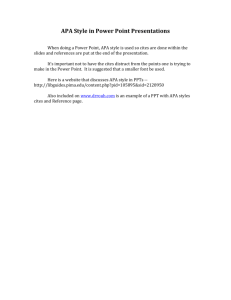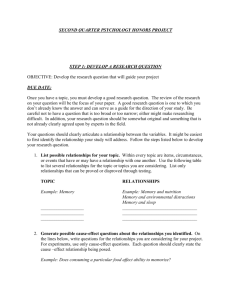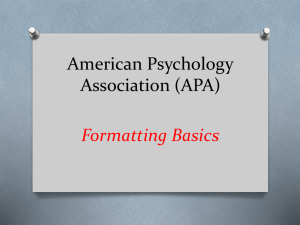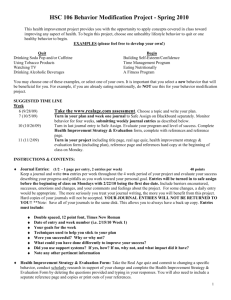APA Paper Template - Oakland University
advertisement
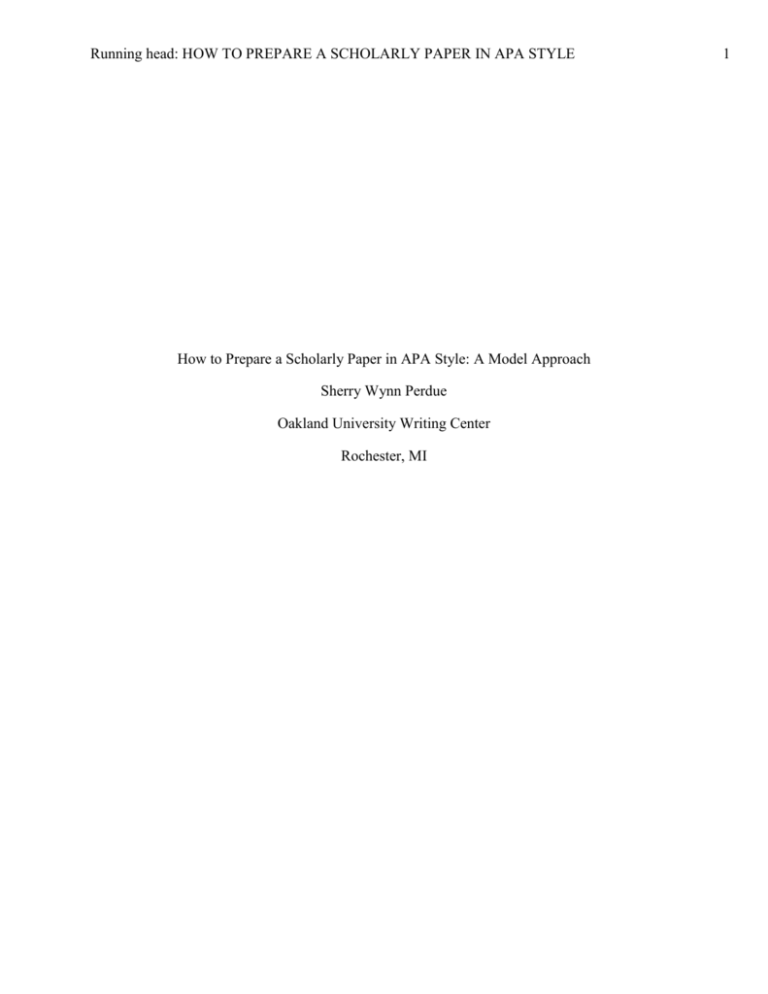
Running head: HOW TO PREPARE A SCHOLARLY PAPER IN APA STYLE How to Prepare a Scholarly Paper in APA Style: A Model Approach Sherry Wynn Perdue Oakland University Writing Center Rochester, MI 1 HOW TO PREPARE A SCHOLARLY PAPER IN APA STYLE Abstract Direct instruction in documentation style within individual classes is the most promising route to student mastery (Goddard, 2003). Because many Oakland University Writing and Rhetoric (WRT) students and faculty members have expressed trepidation about embracing American Psychological Association (APA) style, favoring the familiarity of Modern Language Association (MLA) style, Wynn Perdue developed this template into which students can cut and paste their content. It is her intention to make formatting more tangible and less stressful for the novice. Keywords: APA, results, sources, writing center 2 HOW TO PREPARE A SCHOLARLY PAPER IN APA STYLE How to Prepare a Scholarly Paper in APA Style: A Model Approach for WRT 160 The “Introduction,” which does not include a header, overviews the mental health issue about which the author writes. In it, the author provides context and history as needed. S/he might also cite the experiences of the memoirist whose work encouraged the investigation. The introductory section of a longer document, which could run one to several paragraphs, should end with an essay map, a sentence that indicates the talking points in the order of which they will be discussed. Literature Review In a social science research paper, the first section is generally a literature review in which the author frames the peer reviewed (refereed) scholarship available on the topic by synthesizing multiple authors into individual topic paragraphs that address different issues identified by the experts. The paragraphs are idea focused rather than source focused. The content of each paragraph is driven by what the sources know/believe/demonstrate. Therefore all claims, statistics, ideas, etc. must be supported by an author’s name and date either in the running text or within a parenthetical. The transitions between and among paragraphs should be organic to the discussion. In other words, the reader should see a clear logic for movement from one idea to the next. The author reminds readers of what they just learned and previews what they are about to learn. Methods If the paper is a research study, the next section details the author’s methodology: Was it quantitative, qualitative, or of mixed-method design. This section also addresses the theoretical lens from which the research was viewed, the number of subjects, the approach by which any 3 HOW TO PREPARE A SCHOLARLY PAPER IN APA STYLE statistics were gathered, etc. If the paper does not include the writer’s own research, a methodology section is unnecessary. Results After the writer has clearly articulated the purpose (introduction), overviewed relevant scholarship that justifies the current study (literature review), and demonstrated how the data was collected and analyzed (methods), s/he is ready to share what was found. Discussion For many novice readers, the introduction and discussion are the most important parts. While these readers might not understand t values, they can garner important information here about what the authors think the data reveals. Within this section, therefore, authors should explore the implications of the findings for the discipline, etc., and they should address the limitations of the current study. 4 HOW TO PREPARE A SCHOLARLY PAPER IN APA STYLE References Goddard, P. (2003). Implementing and evaluating a writing course for psychology majors. Teaching of Psychology, 30(1), 25-29. Wynn Perdue, Sherry. APA documentation (6th Edition): A self-paced tutorial. Retrieved May 12, 2011 from http://www.oakland.edu/?id=11916&sid=235 **HELPFUL WEBSITES: http://owl.english.purdue.edu/owl/ http://citationmachine.net/index2.php 5

